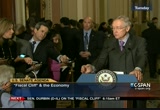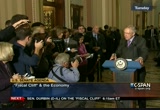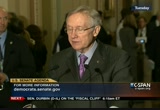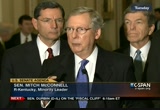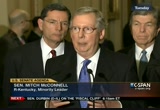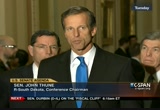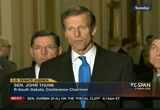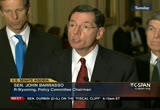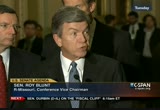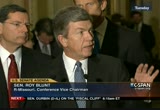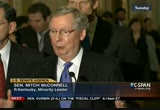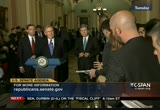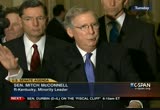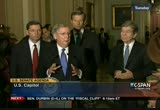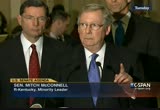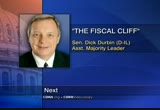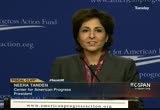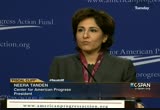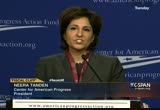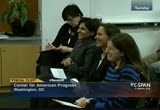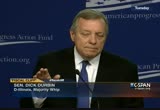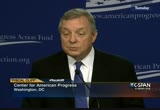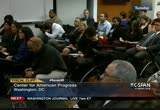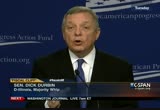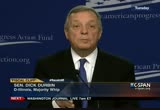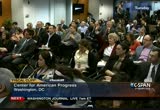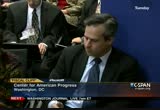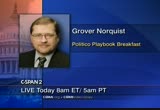tv Capitol Hill Hearings CSPAN November 28, 2012 6:00am-7:00am EST
6:00 am
>> there are things we have already taken care of, the first of april and take a look at that stuff. that's not essential.>> [inaudi] >> we cannot do anything until we get something with the white house, and that will be as early as tomorrow or the next day. >> [inaudible] >> republicans. [laughter] >> you said what is holding it up, i said republicans. talk to republicans. it is up to them. i have said on a number of occasions, the internet poker bill could move forward if we get 15-17 republican votes. we have got none.
6:01 am
>> i am extremely hopeful. i did not believe the republicans will allow us to go tubhe cliff. i hope that is true. it is such a simple problem to solve. we have had experience. we know. a couple of rounds with the speaker and obama. we had the judd gregg kent conrad. we know it. it has been doing something with actual tax revenues. mitt romney proved during the campaign you cannot do it just by doctoring up the tax code. that should be part of the deal. we need to have tax reform, we have to have the people that have done so well during the difficult time with the economy, the richest of the rich will
6:02 am
have to pay a little bit more to solve the idea of the problems of the country. -- to solve the financial problems of this country. >> good afternoon, everyone. as we head into the fiscal cliff negotiations, my advice to the president would be -- seems like our friends on the other side are having difficulty turning off the campaign. we need to sit down and work this matter out. i think we have a clear sense of the year to do something important for the country. we all know that the most critical steps to be taken are to save the entitlements, which
6:03 am
are on an unsustainable path to bankruptcy. there's no better time to begin to fix that problem than right now. so i would hope our friends on the other side can kind of turn off the campaign and get into a cooperative mode here to reach a conclusion. which leads me to make a further observation about how unfortunate it is that the majority leader has chosen to create an extraordinary controversy here in the senate right here at a time when we ought to be encouraging maximum bipartisan cooperation, about threatening to employ the nuclear option, which is to break the rules in order to change the rules of the senate. i hope cooler heads will prevail as we move through the process. we need to be working together. the election was november 6. we won't have another one for two years and it's time to start pulling everybody together as the american people expect us to do know matter how they
6:04 am
voted last november to begin to solve this big problem. >> as the leader mentioned, the issues with regard to the fiscal cliff is pretty straightforward and the president in his press conference shortly after the election stated its his goal and priority, jobs and the economy. ought to be about jobs and the economy. republicans couldn't agree with him more which is why the proposal the president has put forward to solve the fiscal cliff raises taxes on a million small businesses who employ 25% of the work force and an accounting firm has done a study has said if the president's proposal went into effect which is to raise taxes on the small businesses out there that it would cost us over 700,000 jobs and reduce take-home pay by 2% and reduce economic growth by 1.3%. what the president is proposing to do would hurt jobs and the
6:05 am
economy, which is again, i ironic in that the president's only solution to solve our fiscal cliff issue is to raise taxes. in 2010, we had the same debate. raise taxes in the middle of a weak economy. at the time economic growth was 2.4 through the first three- quarters. number is 1.8%. the president said you shouldn't weak economy. has to lead on this issue. on people who create jobs in this economy if it is about jobs and the economy. and we all know what drives federal spending in this countryand we have seen no proposal from the president when it comes programs and getting them on athere is a solution out
6:06 am
there, solution is to raise taxes on the very people that we're looking to to lead us out of time. >> the president says he is focused on jobs and growth and what republicans are committed to is providing good jobs for working families. and one of the ways we are going to do with the keystone xl pipeline. we joined nine democrat colleagues to write a letter to the president to ask him to meet with us to focus on keystone xl pipeline. wonderful way to do it. talking about 20,000 jobs and the additional jobs related to the direct jobs of the pipeline. focuses on jobs and allow us to continue to produce goods and services in the united
6:07 am
states. president, if he truly is focused on jobs and growth should be embracing today and should not continue to delay. >> at the very time we ought to be finding ways to cooperate and find a solution to the fiscal cliff, i really think that the majority leader has decided to needlessly kick over a hornet's nest. i like the house. i think it's open that the house function like the house. but it's important that the senate do the job the way the senate is supposed to do. into the house and you shouldn't break the rules to change the rules. i don't think anybody has any doubt if they try to change the rules of the ongoing continuous body that the senate is, that the parliamentarian will say
6:08 am
that the rules say it takes 2/3 to change the rules and the majority would say, we don't says, we are going to chain the rules any way. in an environment anything that passes the senate without republican votes is unlikely to pass the house. years to get to every political is to blame instead of having rules. the three times we followed the rules this year, we passed bills. the highway bill, the postal reform bill and the ag bill, all passed. amendments anyone wants to offer and do what the senate does every single time when we did that, we passed a piece of legislation in a bipartisan way. anywhere in the house. at least i would understand there was a governing argument if the majority leader had a
6:09 am
said what we pass here is going just going to pass it with all over again. that is not the case, believe me, this is a hornet's nest that makes it harder to get the work done that has to be done and>> questions. >> what filibuster reform would>> what ought to be happening, ought to be sitting down not rules changes are appropriate. agreement, it would be done in a manner consistent with the rules, which would require 67 votes, which i don't wouldit is important to remember that the senate hadn't always functioned like it has the last two years and the rules were exactly the same.
6:10 am
but a behavior problem. and the majority leader has insisted on not allowing amendment tree, which of course not only prevents us from offering any amendments that he doesn't agree to allow, but prevents his own members from offering amendments. committee work is irrelevant. members serve on committees. their bills are never brought up. senator blunt mentioned three examples where we followed the normal procedure and all the bills passed. what we need is a majority leader with a different view about the senate, consistent with its norms and traditions. but on the issue of changing the rules, the way that's normally done is the two leaders sit down and see what might be appropriate. i would be happy to do that. that would be a good time to do it looking into next year. >> on that issue, two different things have come up at once, the fiscal cliff, which you said we need to draw people together. how are the two things connected
6:11 am
in your mind, you all are trying to find a way to an agreement to the fiscal cliff. the fact that this rules controversy, how are the two connected? >> if i were the leader, i would feel really good about the election. kept my majority in the senate minority, we have big issues that can only be solved on a bipartisan basis, how can i be building bipartisan confidence going into these huge issues that we have before us. the last thing on my list would the senate, have it blow up and have everybody mad as heck. i mean, i'm just perplexed about the judgment on display here blowing up the senate at a time when the election is behind us.
6:12 am
two years. turn the election off. bring everybody together and try to solve big problems. consequences. of course, we want to get an unsustainable growth rates of our very popular entitlement programs. the president has indicated an openness to that and now's theand i hope we can put all this on a bipartisan basis, which would help us get there here at the end of the year. >> the president and leader reid said social security should be off the table. what's your reaction to that? >> all of the entitlements need to be discussed, because they on
6:13 am
an unsustainable path. medicare is in more immediate danger. we want to save these programs and i understand the dilemma that the president and thethey don't want to change anything. well, times change. and until we make sure these popular entitlement programs fit the demographics of the changingit's simple math. what we have lacked so far is the political courage to do what needs to be done. look, i'm not happy about divided government. i would rather have a republican president, republican senate and republic house.
6:14 am
good things about divided government, it's the best time to do really hard stuff and i'll give you four good examples. did the comprehensive tax reform. clinton, welfare reform and balanced the budget for multiple years in the late 1990's. this is the perfect time to solve single biggest problem confronting our country and we are anxious to sit down and get the job done. \[inaudible question] >> dick durbin says as talks continue on of this booklet democrats must be open to painful topics, including
6:15 am
medicare and medicaid. he was at the center for american progress for about 45 minutes. >> good morning, everyone. thank you for being here. i am the president of the center for american progress. we are thrilled to have senator durbin here today to talk about his views on the fiscal cliff. as we engage in this debate, i wanted to lay out a few principles that are critical as washington becomes obsessed with this set of issues. the elections have consequences.
6:16 am
at c.a.p., we have argued that the issues that are really framing the fiscal debate and fiscal cliff were ones that were litigated in the election context. the president did not have one set of conversations before november and a second set now. there was a thread going through the debate that the country was having and that thread was around having a balanced plan to address america's fiscal challenges. there are serious fiscal challenges that we do need long term -- deficit reduction -- that is important to america's credibility. it is important for america's economy and economic growth. that plan has to be balanced, and that means significant revenues and that paying has to go around. that means the wealthy and well- off have to pay their fair share as well. these should not be new issues.
6:17 am
they are ones that were debated. they came up in every debate -- even the foreign policy debate. the american people are on the side of the president and democrats who are making this case. that is not to say that there should not be spending as part as this debate. there has been over $1 trillion in spending cuts. that is a part of this debate that gets lost. just because washington has a short memory does not mean we should all have one and that there has already been sacrifice on behalf of the american people through those domestic discretionary cuts. we are excited. c.a.p. has been a lot of work on the fiscal cliff. we have talked about medicare savings that can improve and strengthen the program and
6:18 am
address rising national health expenditures. we will have more to say on the issue of taxes. we are ecstatic to have senator durbin here today, who has played a fundamental role over the last several years. he has been part of every negotiation that has taken place. he is still an optimist. that is a sign of progress. he has had a long history of being a champion and advocate for the middle class. he has carried that advocacy in the budget negotiations. he was part of the supercommittee, this fiscal, the gang of eight, the gang of six -- almost every gang that has been involved in these issues. he has been a fighter for what is right and for having a plan that stands true to the values of the american people and the people who voted and waited in line for hours on end to vote -- people who want a fair shake out of washington.
6:19 am
as a champion of that fair shake, i am excited to have senator durbin. >> neera, thank you very much for those kind words. it is good to see you. thanks to the center of american progress for the all the work you do. elections have consequences, and politics is driven by a lot of things -- candidates and money -- but many times it is by ideas and issues. the center has been on the forefront of this effort to make sure that progressive ideas are backed up by more than just feelings of the heart but arguments of the mind that are compelling and persuasive. thank you for doing that. i do not know what we would do without you, and it is an honor to be here with you. i have been involved in a lot of gang activity. it started with harry reid appointing me to the simpson-
6:20 am
bowles commission -- 18 members. i thought this was another commission who'd work product would be lost in history and on a dusty shelf or buried in some hard drive. it turned out to be a historic effort and a game changer -- mainly through the good work of erskine bowles and ellen simpson with hard work that was put into this by 18 members, evenly divided among house and senate democrats and republicans and six public members. 11 of us voted for the final work product. i was invited to join the gang of six to continue the conversation on simpson-bowles. it expanded to the gang of eight. the conversation has been going on for two years. that is a lot of popcorn in mark warner's office. it was a great education and effort to sit across the table
6:21 am
from conservative senators and talk through not just the reality of the deficit but the political reality of the deficit, which we have to be more sensitive to if we are looking for an honest solution. some of my friends on the left came to visit. i recall one -- the labor leader who said -- what is a nice progressive like you doing in a place like that? why are you hanging with those people? they are up to no good and they are not going to do the things you go elected to do. i disagree with this person. i said -- given the choice between attending a press conference with you, walking outside, walking outside with a sign, or being seated at the table, which do you think is a better place for me to be? she paused and said -- stay at the table. that is the reason i have been
6:22 am
there because i have a role to play -- a voice to add that is not going to be there otherwise. just by way of background -- a little bit -- dave copperfield here. i ended up in politics thanks to two paul's -- paul douglas and paul simon. douglas was my first person i met in politics, a u.s. senator -- an extraordinary man who served until 1966. i was a college intern in his office. he used to say -- you do not have to be a wasteful to be a liberal. i think we would say -- you don't have to be wasteful be he was much more literate than me. paul simon is well known as a progressive liberal. he was also a strong supporter of the balanced budget. i happen to agree. i believe what we face now is a threat to our country, to our budget, at every level. the money we are borrowing to sustain our government is money borrowed to sustain food stamps as well as the pentagon.
6:23 am
we ought to be thinking of that in terms of our values and our future. let me speak to a couple of elements here that i think progressives should keep in mind. progressives cannot afford to stand on the sidelines in this fiscal cliff debate. important critical decisions will be made soon that will affect this country for 10 years. i think we need to be a part of this conversation. we need to be open to some topics and some issues that are painful and hard for us to talk about. we cannot stand by the sidelines in denial that this is ever going to engage us in the things we value. we cannot be so naive to believe
6:24 am
that just taxing the rich will solve our problems. i believe that is an important part of a solution. we have to look to reform and change that is significant, that preserves many of the values and programs that brought us political life, and we cannot believe that merely ignoring these programs or not engaging will solve the problem. pick up any of the newspapers and look for the full-page ads and you will see on a daily basis organizations that we respect and are engaged in political campaigns, buying ads basically saying to the left, keep your hands off entitlements and to the right, keep your hands off of texas. if both sides heed those warnings, nothing will happen. it is better for us to engage with basic grounding in values and principles. let me tell you what i mean. first, i start with the premise we need to preserve and extend
6:25 am
productivity in the tax code. the lesson is clear. we know what happens in middle income families and those making less. they are falling further and further behind. what the president has proposed and what the senate has passed, the $250,000 protection, that is significant. if we do not protect those families from the fiscal cliff, they will see their annual taxes go up $2,000. it will be noticed. it should not happen. i hope the house will take up the president's challenge an invitation and pass the senate bill to protect families making less with one vote, they can avert the fiscal cliff for 98% of american families, at least when it comes to income taxes. it is necessary.
6:26 am
we know what has happened over the last several decades. it is the worst it has been in almost 90 years. between 1980 and 2005, in the 25 year time period, more than 80% of the total increase in america's income went to the wealthiest. 90% has got to the top 1%, the median income of the middle class has declined. i could go on and give illustrations. i do not think i need to to this group. when we address the issue of revenue in taxes, i insist in every meeting i have been in that it needs to improve it for low income categories.
6:27 am
that is the starting principle for those of us who are progressives. the second thing we must insist on is to protect the safety net for america. make no mistake. as good as we are, there will always be people in this country who will need a helping hand. because of a physical or mental deficiency. they will need a helping hand. or just the economic circumstance they find themselves in. i went to a food bank last year. i was in a warehouse and i took a little tour. there was a nicely dressed young lady there. i watched. i thought she must be on the board here. i talked to her. she talked about her kids.
6:28 am
to work for the local school district. she was glad to have her job. it did not pay enough money. she was a single mom with two kids. she said, i want to thank you that the program lets me take my kids to farmers' markets. it is a great thing for fresh fruits and vegetables. they get to talk to farmers. here is a woman trying her very best to need a helping hand. months ago, i was at a methodist church food pantry in chicago. i ask the lady she was on social security. a hundred dollars a month. i said what your rent and utility costs come to? $600. i asked her how she makes it. she says, i come here and they give me three days worth of food each month. she says, and i get food stamps worth $37 a month. that is the reality for many people struggling. as well as those who are tired and in the impoverished state. at the end of the day, when we talk about our budgets and deficits, we have to make sure we do not look the obvious, that is that the safety net is essential for our future. the third element i would like to make is a guided principle
6:29 am
that we have got to keep our recovery on track. it is absolutely essential that this recovery, which is moving forward slowly, continue to move toward. we know if we are not careful, it will stop economic growth and hurt everyone through every income category. we have got to make sure as we phase in a deficit reduction, we are mindful of the economic recovery we are dealing with. that is essential. i hope my friends at fox are sitting down when they hear this. it may come as a shock. president obama did not event trillion dollar deficit. he inherited them. the day he took office, we were in a freefall. despite extraordinary steps needed to do with a great recession, the deficit has
6:30 am
decreased every year for the last three years, from 10% of gdp in 2009 to 7% of gdp today. the source is not the democratic national committee, but a respective publication. it has fallen faster over the past three years than it has in any stretch since demobilization in world war ii. after that, the only time the deficit has fallen faster is when the economy relapsed. the article went on to say, if u.s. history offers any guide, we are already testing the speed limits of a fiscal consolidation that does not risk backfiring. that is the point i am making. let us be careful as we implement deficit reduction that we are sensitive to the recovery. we do not move too quickly.
6:31 am
now comes the basics. i go back to simpson-bowles. i think they have it right. put everything on the table. not only taxes and revenue, but spending cuts and entitlement reform. let me speak about each of them. first when it comes to revenue. so many people who talk about simpson-bowles. it relied on revenue for 40% of the deficit reduction over a 10-year period of time. it is understandable when you read the report why they said this. if you look back to the last year when we had a balanced budget, you will find at that point in time, our revenues
6:32 am
reflected 19.6% of our gdp. our spending reflected 19.6% of gdp. where are we today? you get different estimates. warren buffett said 15.5% yesterday is coming in as revenue. i have heard lower figures. that is the reality of what has happened. we have seen a decline in tax revenue and an increase in spending for a variety of reasons. if we are serious about deficit reduction, we have got to move back the golden 19.6%. abouttalk for a minute what has happened. the chairman of the appropriation committee. let's take a look at where the art today compared to where we were in fiscal year 2001 when the federal government ran a
6:33 am
$128 billion surplus. compared to the 2001 figure, we are spending less on non- security concessionary spending than we were. the growth in spending has not been in the non-defense discretionary. the cost of security programs in that same time period has gone up 60%. the cost of mandatory programs is up 30%.
6:34 am
i want to call your attention to one aspect progressives need to remind people. of the $1.50 trillion already in spending cuts, $900 billion comes from spending. we have given far more than when it comes to defense side. let's talk about those for a minute. the budget control act and sequestration would result in dramatic cuts to spending. we have heard a lot of talk about the impact it will have on our national defense.
6:35 am
to believe that having ended one war in iraq and ending another in afghanistan that we cannot find savings in the pentagon, i do not think that is a fair assessment. there are savings to be had that will not compromise our national security. the simpson-bowles commission approach established in the outer years to lay the temptation to go back into the non-defense accounts when too much political pressure keeps you out of defense spending. i would hope any long-term agreement would improve that. on the non-defense side, i think there are savings to be found. a hats off to debbie and pat
6:36 am
roberts putting gather a reform bill that saves us money in the next 10 years. that is something that hits my state. there are other areas where savings can be found. we need to look at those honestly. i think infrastructure is one area which we should consider a revenue source toward an infrastructure bank. we are not spending enough or investing enough in the infrastructure of america. today, china invests 9% of its gross domestic product in its infrastructure. europe, 5%. america, 2.5%, barely enough to sustain and repair what we have in place. there are no grand visions i had about infrastructure and there should be carried beyond the obvious of highways and airports, we have to be thinking about our energy infrastructure
6:37 am
in this country and whether it serves our economy well. we have already seen thoughtful suggestions on on both sides of the aisle. when it comes to spending and future, we need to be thoughtful about ways to fund infrastructure. many of you saw the article recently in "the washington post." i want to give a belated thanks to the soviets for launching sputnik and schering americans. because of it, there was a program that got me through college and law school. these loans make a big difference, whether it is pell grants or loans. let me look at this honestly. 25% of the federal aid education goes to for-profit schools. they have more than double the student loan default rate than
6:38 am
any other. there are ways to cut back on spending and education that will give us opportunities and resources for real education, which can be part of our future. when it comes to the most painful topic of all. i came here in 1983 and was told social security would be on its way out. we rolled up with our sleeves and came up with a bipartisan solution that ultimately bought over 50 years of solvency for social security. we raised the retirement age, payable taxes on social
6:39 am
security, and we taxed those social security benefits indirectly for the first time. today, social security will make every promised payment for the next 22 years. you cannot say that about much in washington. social security has not added one penny to the deficit. for those who say there is good reason to push it off the table and wait, i would add a note of caution. small changes made today in social security will play out over the long run to buy us solvency for a long time. we should take perhaps all the security off the table but be very honest but we will achieve in the near term. i think we should create the
6:40 am
equivalent of eight simpson- bowles region of a simpson- bowles, and come up with a plan to buy 75 years of salt with the rigid of solvency. i might add a wrinkle here. every 10 years, a similar commission ought to be created. let's not get into this mess where we have six months to go with social security. you know how important it is for people. people are devastated by the recession and their pension plans lost. it is important to us, our kids come and grandchildren. i think we should create a commission that will report back to congress before a vote by the end of the next calendar
6:41 am
year. i want to talk about the two toughest elements when it comes to entitlements, medicare and medicaid. represent about 20% of our budget. they are a real challenge to us. untouched, and amended, medicare will run up money in 12 years that is scary. we have so many americans who count on it. almost 50 million americans and the number is growing. yesterday, in america, 10,000 reached the age of 65. it will happen tomorrow. it will happen every day for the next 18 years. these are people who paid in over a lifetime and expect the protection they have invested in to be there.
6:42 am
asked to be there. we need to take an honest look at medicare. i believe the paul ryan approach was not the right approach. i thought his idea of premium support would raise the cost of medicare is turned on many seniors. i think it was unworkable and did not support. some suggest raising the medicare retirement age. i have trouble with that. my trouble is in my family, i have an older brother who passed away a few years ago appeared when he retired, he had health insurance from his employer and then had a massive heart attack and surgery. they canceled his insurance. my very conservative republican brother, who had no use for a social program, started counting the days until he was eligible for medicare. that was the only place he could turn. what was at stake were all the savings he put together for his family. if anybody wants to talk about a later eligibility age for
6:43 am
medicare, what i want to hear is the assurance and guarantee that people like my brother will have access to affordable health care insurance during any time. until i hear that, i am skeptical. i want to see more before i go forward. when it comes to medicare, there are savings to be had. savings that were brought up by the bowles-simpson commission. i will not go through them in particular. savings that will not compromise the care to beneficiaries but can lead to real efficiencies and the delivery of health care. medicaid is a special case as far as i am concerned. when i mentioned social security and medicare, i know organizations in this town who are deeply committed to those programs and are very
6:44 am
politically articulate. they are involved if not with money, certainly with vote. members of congress pay close attention to them. medicaid is an illustration from the state of illinois and means the following. it is the only health insurance for one out of three children in illinois. it pays for more than half of the births in illinois. that is not even half of the cost of medicaid in illinois. 60% of the cost goes to take care of the elderly, frail, and disabled. many of them in institutional settings, flat broke. all they have is social security, medicare, and medicaid. when the ryan budget suggests block granting medicaid back to the states, and essentially cutting the money by 37%, my question to him and people on that side is, which group do you want to reduce coverage by by one-third and what will the consequences be?
6:45 am
let me tell you what i think the good news is. i think we will get this done. i am heartened by many of my republican colleagues who have stepped forward and said their real oath is to america and not to a washington lobbyist named grover norquist. that is politically courageous. many have already said this. i respect them so much for it. as more do, it will create an environment for us to reach an agreement. we need the same willingness to step 4 on the left to be able to meet in this room at the table or wherever the room maybe and to come to an agreement that will lead us forward. one thing i am hoping for is if we can reach an agreement, in
6:46 am
principle before the end of the year, then implement it, i believe this is what many have been waiting for to launch a more spirited recovery. if we get this done, if we have a credible $4 trillion deficit reduction plan signed and sealed, signed by the president, what does that say to the rest of the world? many economies in europe and other places are struggling, but ours will be the strongest in the world in terms of the future. it takes a lot of hard work but it is worth the effort. all will prosper. saturday night, my wife and i went to see a movie by spielberg. about another gentleman who lived in illinois for a while named abraham lincoln. toward the end of the movie,
6:47 am
daniel day-lewis was sitting across from confederates and there was talk about what the war was all about. you had seen all the death and division across america. at one point, lincoln said, it was about proving that democracy is not chaos. in those days, the cost of that group was 600,000 american lives. thank goodness we do not face anything like that. but we face the same challenge. i do not know if there was a mandate that came out of the election, but there was a work order to get to work and do it together and get the job done. i think we can do it. those of us on the left on the progressive side can make a positive contribution. [applause] >> thank you for those remarks. we do have time for questions. questions from the press first.
6:48 am
6:49 am
it was nicely done. each of us were visited and asked what we think. i said, i cannot vote for that. there are six things here that are showstoppers as far as i am concerned. i will fix those things or i am voting against it. he writes down those things and leaves. the next thing that happened was we did not have an amendment process. we had a final draft. four or five of the six were taken care of. i voted for it. it takes leaders who are willing to sit down and make compromises and listen. in this case, the negotiation is directed between the white house and speaker boehner. there is no better person for the president to sign for the job, i have known him for years and i have the highest respect. i hope speaker boehner will agree to one basic principle and i think we can get this done. the solution on the house side will be bipartisan. have to be in the senate. it this will be an exclusive republican solution on the house side, i am afraid we will reach the same impasse we have
6:50 am
had in the past. if he will make a commitment to a bipartisan solution, i think we will get this done. >> over here. >> you mentioned medicaid is a special case. does that mean there are no savings or are there and what would they be? >> there are. it is a special case because of the political circumstance. the people served by medicaid are not politically powerful. they are the poorest of the poor. they are not in a position to speak for themselves. that is what i meant. there are ways to save.
6:51 am
simpson-bowles goes through a list of possibilities. one is something every state has tried. it is a nice move to come up with more state funds, but it has got to come to an end. that is a bit of a trade. the dual eligibles. if people are eligible for both medicare and medicaid, the reimbursement for services and pharmaceuticals and others will be in a medicaid level, a lower level of reimbursement. i think there are ways to do this. the waiver process here can be helpful. we can learn some things. we talked about experimenting as we went through the affordable care act. the hospital has a checkered history. under our new president, they ask for a waiver so they can take the new medicaid population that will come on board and get to them early, established
6:52 am
preventive care and medical homes for these people. i think this will be a real money saver as we start thinking about early interventions and coordinating care for people who are chronically ill and very expensive if they are not cared for. >> you also talked about investment and infrastructure, renewable energy, are you calling for a specific language that would involve these types of investments? >> if we were going to put limitations on spending, which is likely, there has got to be room within those to build this economy. we cannot reach the point where we are mindlessly cutting right and left. there are some things that really do create jobs and opportunity and growth in our economy. education, infrastructure, research, those are the basics i would try to fund.
6:53 am
what i suggest, going back to simpson-bowles, is finding a revenue source that will help us build an infrastructure bank. we have got to come at this differently. relying on a larger and larger share of general revenue to fund it has become a problem. it is better to find a self- funding mechanism. >> in your remarks, you mentioned the affordable care act. you say you do not want it gutted or repealed. you did not mention it in these remarks. where are you on reopening it at all? is there any money to be had from other parts that would leave it largely intact? >> i apologize to you and my speech writer for not going through every page she had written with my approval. i fully incorporated by
6:54 am
reference every word of it. here is what i think. this election made the decision that we are going forward as we should. i think it is the most important vote i have ever cast in terms of long-term economic health and liberal health of america. what i said before i will say again. the only perfect law i know it was carried down on stone tablets by senator moses. everyone realizes changes have to be made over time to the law. will they create competition and price limitation as a result? is the premium support we are offering to families making less than 400% of poverty going to be adequate for them to still by an insurance from exchanges? we will learn this going on. the one we know for sure is if the other party prevailed, we
6:55 am
would be in the sewer. i am open to whatever elements we need to reconsider their. we have got the right starting point. >> the senator has time for two more questions. >> do you anticipate republicans will demand more deficit reduction on top of what they are already asking for in exchange for raising the deficit, which we are expected to hit? is that already accounted for in the $4 trillion ultimate grand bargain? >> the first thing we have to come up with is a number. the consensus is $4 trillion. based on some calculations, we
6:56 am
have got a great down payment of $1.50 trillion in spending cuts already. the president has called for all up to $1.60 trillion in revenue. there are some i have sat with for a long time. $9 trillion. thomas has a big deal aboutwe have talked about $5 trillion. i think it will be closer to $4 trillion when it is all said and done. i think the president will not sign off on any agreement that does not include some certainty as to budgets, appropriations, dealing with our debt ceiling. we will not find ourselves with some big party celebrating in february and turn around in march and have another doomsday scenario. we have got to get this done as a package. i think we should. >> the final question right here. >> i was hoping you could weigh
6:57 am
in on the present's strategy. he is taking his views directly to voters. related to that, together with the house republicans saying they will go out and have their own event, a sign? >> i do not think they stalled. we are playing ping-pong up here and rolling bowling balls under the table. there are different things at different levels of activity here. what i think is happening, the real talks are underway between the speaker's staff and the president's staff to see what we can come to an agreement on. in the meantime, i think the president is trying to show what the polls already show us. 60% of voters who voted for him agree with the premise that the wealthy should pay more in taxes. 70% believe the taxes should be
6:58 am
part of this whole solution. i know we have heard it and could give each other speeches about what we did here on the other side about small business. we will get an answer to that as well. the public debate will continue. the real work will have to be done on a person to person basis between the speaker pauses office and the president. i am more optimistic than most. i believe we can come up with the fundamentals in agreement before the end of the year and avert this fiscal cliff. >> as progressives, we have no better champion then who is at the table and part of the gang. thank you for joining us. [applause] >> > several live events to tell you about this morning. political -- politico hosts a discussion with grover norquist
6:59 am
on c-span to edit o'clock eastern. the bipartisan policy center looks at lessons from the 1990 federal budget deal. speakers include tom foley and john sununu. in a few moments, today's headlines in your phone calls live on "washington journal." at 10:00 eastern, the house transportation committee will hold an amtrak operations meeting. and the house of representatives will be back in session at noon eastern. in about 45 minutes, we will hear about the investigation into the attacks in the benghazi , libya from a correspondent from "nation
116 Views
IN COLLECTIONS
CSPAN Television Archive
Television Archive  Television Archive News Search Service
Television Archive News Search Service 
Uploaded by TV Archive on

 Live Music Archive
Live Music Archive Librivox Free Audio
Librivox Free Audio Metropolitan Museum
Metropolitan Museum Cleveland Museum of Art
Cleveland Museum of Art Internet Arcade
Internet Arcade Console Living Room
Console Living Room Books to Borrow
Books to Borrow Open Library
Open Library TV News
TV News Understanding 9/11
Understanding 9/11